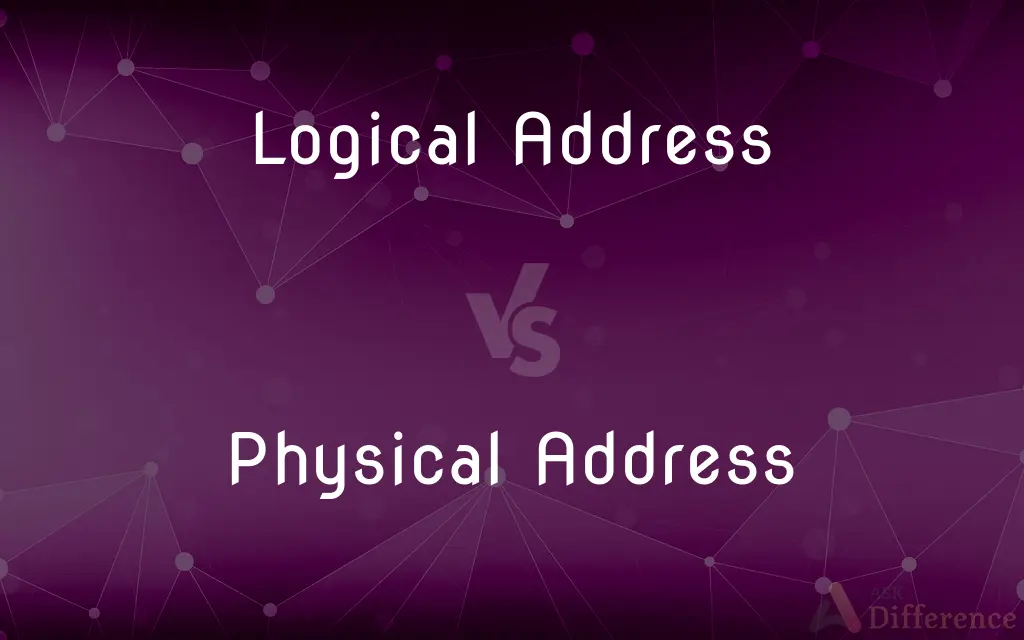Logical Address vs. Physical Address — What's the Difference?
By Tayyaba Rehman — Published on November 9, 2023
A logical address is generated by the CPU and used by a program, while a physical address is an actual location in computer memory.

Difference Between Logical Address and Physical Address
Table of Contents
ADVERTISEMENT
Key Differences
In computing, both logical address and physical address pertain to memory locations, but they serve distinct functions.
A logical address, also known as a virtual address, is generated by the Central Processing Unit (CPU) during a program's execution. This address is utilized by the program to access data and instructions, regardless of where they're actually stored.
Contrastingly, the physical address refers to the specific location in the main memory where data or instructions are stored.
It represents the actual hardware memory location on a RAM chip. The memory management unit (MMU) of a system is responsible for mapping logical addresses to physical addresses, ensuring data is retrieved from the correct location.
The distinction between logical and physical address becomes evident in systems with virtual memory.
ADVERTISEMENT
Virtual memory allows a program to be executed as if it has access to a larger amount of memory than what's physically present. Logical addresses let the program operate within this virtual space.
Physical addresses, on the other hand, ensure that the system knows the exact location to retrieve or store data.
This distinction ensures efficient memory use and keeps the actual memory location abstracted from the executing programs, adding a layer of security and flexibility.
Comparison Chart
Definition
Generated by the CPU for program use
Actual location in main memory
Used by
Programs during execution
Memory management systems
Relation to Virtual Memory
Represents addresses in virtual memory
Represents addresses in actual RAM
Convertibility
Can be converted to a physical address using MMU
Directly accesses the hardware memory
Role in Memory Management
Helps in abstraction and security
Ensures data is physically stored and retrieved correctly
Compare with Definitions
Logical Address
A CPU-generated address before translation by MMU.
The logical address is vital for systems using virtual memory.
Physical Address
The exact location where data is stored in main memory.
The MMU maps the logical address to the physical address to fetch data.
Logical Address
An abstract address used by a program to access data.
Logical addresses keep programs oblivious to the real memory location.
Physical Address
Represents the actual hardware memory location.
Every byte of main memory has a unique physical address.
Logical Address
Represents a location within virtual memory.
The logical address helps the program function as if it has more memory than available.
Physical Address
A non-abstracted address indicating actual storage space.
The operating system keeps track of physical addresses to manage memory efficiently.
Logical Address
The address seen by the software or a running program.
In virtual memory systems, the logical address differs from the physical one.
Physical Address
An address that directly accesses computer memory.
When the CPU needs to store data, it sends it to the physical address in RAM.
Logical Address
An address generated by the CPU during program execution.
The logical address is converted by the MMU before accessing the main memory.
Physical Address
The real memory location in the RAM module.
The physical address is crucial for the proper functioning of memory modules.
Common Curiosities
Where does a physical address point to?
A physical address points to an actual location in main memory or RAM.
What generates a logical address?
The CPU generates a logical address during a program's execution.
Do all computers use both logical and physical addresses?
All computers use physical addresses, but logical addresses are mainly used in systems with virtual memory capabilities.
How do operating systems handle physical addresses?
Operating systems manage physical memory and keep track of which physical addresses are in use or free.
How are logical addresses converted to physical addresses?
The Memory Management Unit (MMU) converts logical addresses to physical addresses.
Can programs directly access the physical address?
Typically, programs deal with logical addresses, and the system handles the mapping to physical addresses.
What happens if the MMU fails to work?
If the MMU fails, the translation of logical to physical addresses would be disrupted, affecting system operation.
Can a system function without logical addresses?
Yes, especially systems without virtual memory where logical and physical addresses might be the same.
Why are logical addresses necessary?
Logical addresses provide abstraction, security, and enable the use of virtual memory.
Are logical and physical addresses the same in non-virtual memory systems?
In systems without virtual memory, logical and physical addresses are typically the same.
Is the logical address space always equal to the physical address space?
No, in virtual memory systems, the logical address space can be larger than the physical address space.
How does virtual memory relate to logical addresses?
Virtual memory uses logical addresses to give programs the illusion of a larger memory space.
Why can't programs just use physical addresses?
Using logical addresses abstracts memory locations, adding security and flexibility.
Which address is used in RAM operations?
The physical address is used for actual data storage and retrieval in RAM.
Are logical addresses fixed for each program instruction?
Logical addresses can vary, especially in dynamic memory allocation or relocation scenarios.
Share Your Discovery

Previous Comparison
Middle Class vs. Working Class
Next Comparison
Vendor Name vs. Company NameAuthor Spotlight
Written by
Tayyaba RehmanTayyaba Rehman is a distinguished writer, currently serving as a primary contributor to askdifference.com. As a researcher in semantics and etymology, Tayyaba's passion for the complexity of languages and their distinctions has found a perfect home on the platform. Tayyaba delves into the intricacies of language, distinguishing between commonly confused words and phrases, thereby providing clarity for readers worldwide.
















































